Scritch scritch scritch … I heard those noises all night long. It was the mice eating the newspapers used to decorate the walls of my rudimentary house. I slept very badly. And it is really necessary to tightly lock my food pannier at all times!
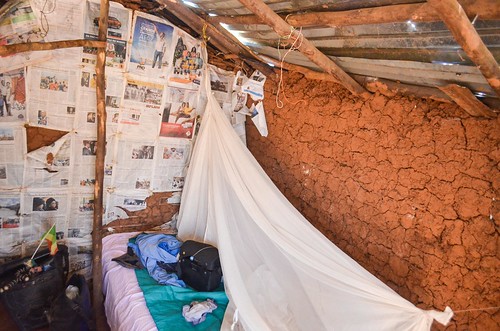
After packing everything, we have breakfast with Bella, followed by a photo session. When someone wants a picture he/she will always make himself/herself pretty and display whatever looks good on a photo. Here, Bella simulates a phone call (even though someone knowing Angola will doubt that the very poor mobile networks reach this village) for the photos.
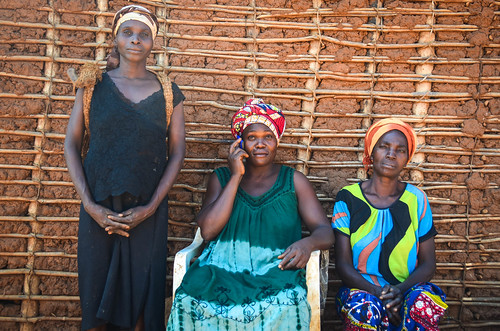
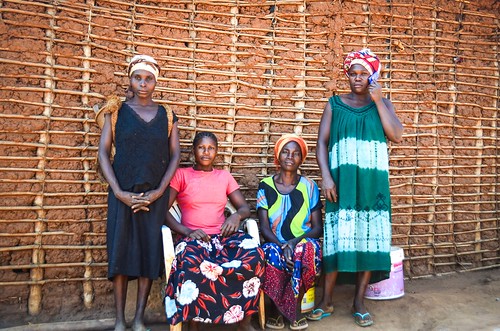
When I am back to my bicycle, ready to leave, much to my surprise, the front tire is flat. How come!? It was alright less than one hour ago and the bike didn’t move. Thank you 2€ Chinese tubes that puncture without cycling, they just melt with the heat. For sure, I would rather use second-hand parts made anywhere else but China.
Finally, as late as 11, I can leave my hosts and go onto the hilly road. It is very hot and I will suffer. The day starts with a bush meat museum. Every hamlet on the road exhibits the catch of the day for sale. Anything with meat on the bones can be eaten. I had heard that around Uige, the large city at the end of this road, it is common to encounter elephants in the wild, and elephant meat in the markets. Elephant meat was described to me as fantastic: some parts taste like pork, some others like chicken, etc. But even if it is probable that locals eat it from time to time, finding it openly in a city market would surprise me.
During the long civil war, people were hiding in the bush and naturally eating what they could. That is why someone interested in wildlife and national parks will be disappointed in Angola.
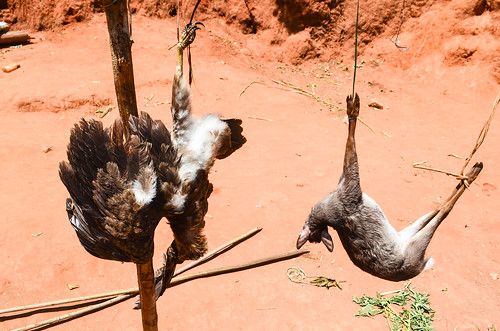
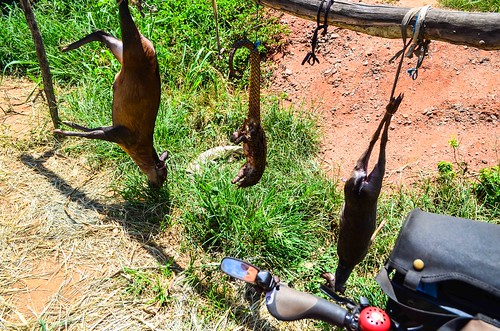
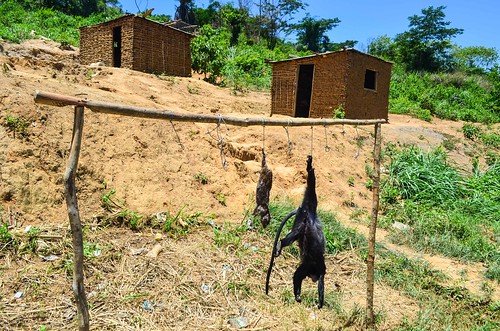
The road surface is good asphalt but the slopes are killing me: it is just a succession of “steep uphill: 10 %” signs followed by “steep downhill: 10 %” signs. I end up pushing a lot and sweating as fast as I drink. The road is narrow but the intercity buses drive fast. The forest is huge and only stopped by small villages of red mud houses.

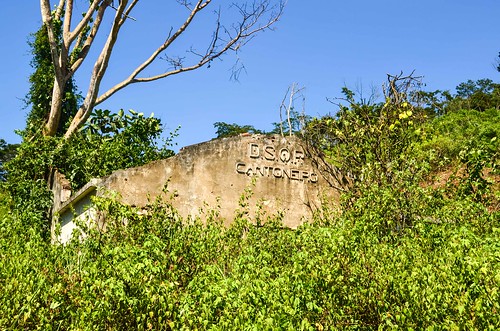
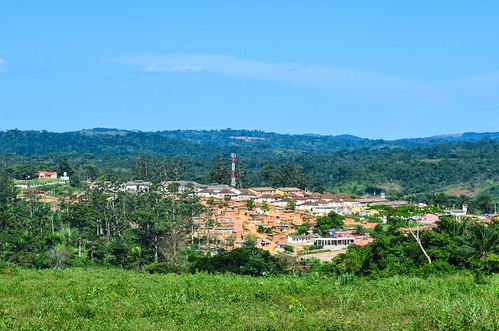

The uneducated “experts in tourists” are even more numerous and more hopeless than anywhere else. They ask me where I come from, and not knowing the place I just mentioned, they will repeat around that “he comes from Luanda“. They ask me questions and change my answers before repeating it to their friends in front of me. All in Portuguese. It is a nonsense and I can’t do anything against it, like if truth and lies were unknown concepts.
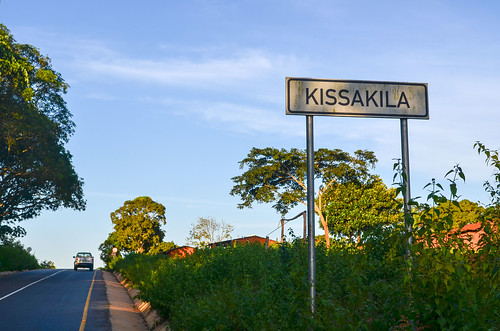

In Quibaxe, the large town dominating the hills, my requests to camp at the school and other places are turned down. “Go to the police station, it is safer“, everyone replies. I am not a fan of police stations, it is actually not safer than anywhere else and especially it is noisy. But well … I end up at their office, not the best option as the sky is clear and the surroundings beautiful, but at least I get a tap to shower.
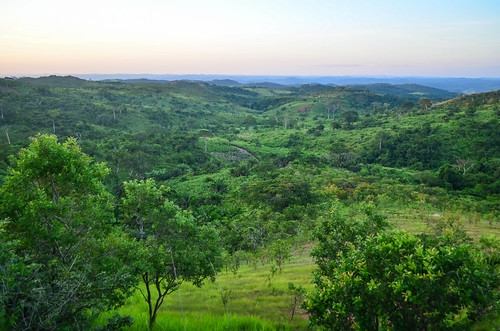
And of course I sleep very badly, once again. The policemen were talking all night long right next to me, laughing loud and re-inventing my life. Giving food and water is almost always part of the hospitality in Africa, but letting someone sleep is rarely considered. I end up pitching my mosquito net outside the building for the rest of the night.

The roads there are not on Google Maps, which are terribly wrong for African roads, as usual. This one to Bula Atumba is not even on the good OpenStreetMap, but it is brand new and smoothly asphalted. Fortunately I have the Michelin paper map, far from being complete, but it helps having three sorts of maps. Either Michelin have not been visiting Angola for a long time, or the government builds new roads at a crazy speed, but it is also often wrong. I must rely on locals to know where the road ends and if it is paved or not.
The scenery through the Dembos hills until Bula Atuba is very scenic. Green, dry and quiet.




Only the shade of the ruins can provide me with a suitable place for changing my front wheel tube. It was half deflated this morning, I must have a patch leaking slowly. I realize I still carry an old Michelin tube with a bent valve, given to me in Yaoundé, and that old broken stuff made in Europe will serve me better than Chinese gear.

The scenery onwards is stunning. I can call it a paradise for cyclists. The brand new road with almost no traffic offers great green views. It still goes up and down around 1000 m but it is cleared up from the forest. Ruins from the colonial times fit in perfectly.



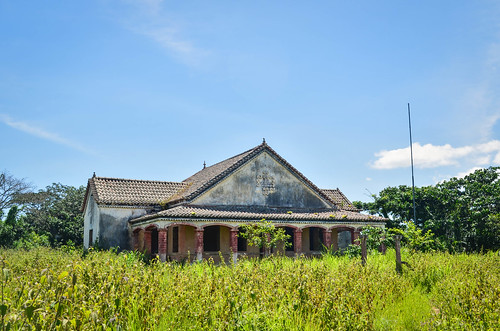


The beautiful road ends in Bula Atumba. It is another small town, hit by the sun, where villagers from the surroundings hut rest in the shade of the run down colonial buildings along the main street. A lady is cooking next to where I stop for groceries and I ask a large portion of everything.
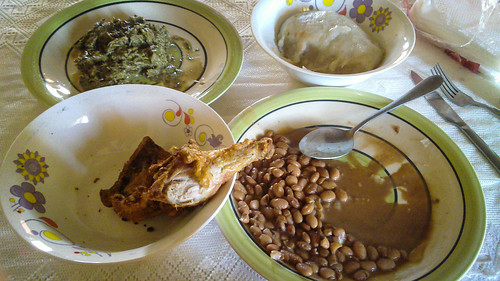
While eating, a cop visits me. He says he wants to talk to me when I am done, and to pass by his office. I have no choice as the police station is just a hundred meters further on the main road. Bad luck … I will have to watch the policemen inspect my passport like a picture book for an hour …
But it is worse. This zealous policeman, after recording all possible details until the name of my parents, decided that at 3 pm, it is too late for me to continue cycling. The road to Ngonguembo is lonely and has many “wild animals”. As usual, people are scared of the wildlife and think I am crazy if I say I camp in the bush. “Aren’t you afraid of lions?” There are no lions and little wildlife, they have eaten everything, and the humans are by far the most dangerous specie out there.
He orders me to sleep at the police station. No way! I will have another awful night, and especially, he is preventing me from cycling during the best hours, from 3 pm to 7 pm. And after all, I have my visa and am free to go where I want to. And I surely don’t want to wait at a police station from 3 pm to midnight with nothing to do.
But the policeman insists. He decided that I should stay with him no matter what I say. He calls his commandante to explains that he is careful about my safety. The commandante supports him and agrees that I should stay at the police station. Pfff …

I can hear the policeman on the phone. “Si, commandante …. si, commandate … si, commandante …“. The ten policemen of Bula Atumba are doing nothing all day long, as nothing happens here. I am the opportunity for the zealous one to show to his superiors that he is working. I bring all the reasons I can so as to be freed. I don’t find it normal that he can stop a tourist’s journey in the middle of the day just to gain visibility … I know that the so-called “we do that for your safety” is meaningless. If I am really in danger, these policemen will be the last ones to take the risk to intervene. The other policemen hear me without saying a word.
After another heated exchange, he agrees to call back the commandante. They now both agree to let me go. Finally! They made me lose one hour. But the deal is that I must report to the police station of Ngonguembo when I reach it … meaning that I am free to leave, but I am not given my freedom back: I have to arrive to Ngomguembo, 40 km of dirt road, before the night. It kills the spirit of cycling. It’s not very satisfactory, but I can’t do anything with a system paranoid about foreigners and safety.

And the road is absolutely scenic. There is no one after the first villages following Bula Atumba. The road is tough, I have to push my bike in stones, in sand, etc. It is getting night and I don’t see Ngonguembo coming any soon. There are many perfect camping spots, but I don’t know what will happen if I don’t report to the next police station by tonight. The good thing is that there is no signal around, so they can’t call me. The bad thing is that when I pass through the town tomorrow, they may be angry that I didn’t respect their instructions and ask me to report at every police station until I exit Angola. It happened once in Mauritania, where the authorities are very careful about foreigners. I told one gendarmerie boss that I was going to sleep in a guesthouse 20 km further, but he didn’t convey the information to his colleagues. And the next day, I got almost scolded by the next gendarmerie checkpoint. “We looked for you all night long! Where were you?“.
I will probably have to extend my Angolan visa and I don’t want to have problems with the police, so despite the night coming, I decide to continue.



At night, I do about 15 kilometers of bike-pushing, on stones, rough roads, gravel tracks taken over by the vegetation, etc …. It is much more unsafe than camping. I use my bike lamp, head lamp and moonshine, but it is very uncomfortable. I don’t have the road on my maps and I doubt a car can pass here. All this trouble “for my security” … Pfff … Plus, I will probably have to sleep at a busy police station for an impossible night of rest.

I finally make it, drenched in sweat despite the cool wind. The lights at the end of the bush track mark the end of my ordeal. It was really a terrible “road”. And under the first public light, a man is waiting. He is the policeman. Nobody cared about me and about where I was sleeping for a week, and it was fine. Now that the zealous silly cop of Bula Atumba alerted others about me, they are all concerned.

I cannot rest yet. I have to go through the bureaucratic process once again. One policeman instruct the less educated of them to note down my details. He can barely read and write. It is maybe the first time he sees a foreign passport. “Name of parents“, “are they still alive?“, etc.
There is an “assistant cop” naturally asking me for food and alcohol, telling me genuinely that I am expected give it out. They ask me to sleep in the middle of the single-room building in ruins serving as a police station, with the lights and the other cops watching TV. No way! These useless policemen are unconsciously doing everything to give me a hard time.
I finally get to sleep in the new police station, vacant and still under construction, so I can get some rest. It is not worth the perfect camp spots by the river I had seen earlier, but the further away from policemen, the better.
I am used to being classified as a “tourist”, as are categorized all the White people in Africa without a job, but it would be really helpful to make a TV spot, to be broadcast all over the continent, teaching that “No, tourists are not paid by their government to visit your country, they also have a job and they decided to spend their money into seeing your faces instead of drinking beers at home, so don’t ask them to pay for yours“. Eish, it seems the concept of “the White man will provide” completely messed up everyone.
“Are you married or single?” are the first words I hear at 6 am, still asleep. The policeman pushed the stone blocking my door in the building in construction to ask the question he forgot when filling up his report last night. And of course, as sleep has no value here, it’s normal to wake up someone for this. The biggest threat of Angola are not animal or landmines, it’s definitely the uneducated police.
I still have the Congolese little flag flying on my bike. I can’t find the Angolan one because it is apparently “sacred” and reserved for the administration. The policemen think it is the French flag, despite Congo being a neighbor of Angola. If I say I’m Congolese, they would believe it. I am happy to leave Ngonguembo and their annoying “security concerns”, but they send me off saying that “Golungo Alto is 45 km. We informed the police there that you are coming …” I don’t know how long this stupid game will last, I need my freedom back.



The road is super scenic as usual, super stony too. I am sure it is possible to break a bike frame on these tracks. I am cycling carefully. Since Bula Atumba, I’ve seen almost no traffic. There is probably a truck taking hours, from time to time, to drive there and to deliver food supplies.
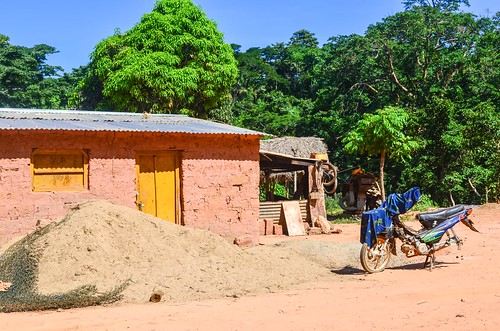
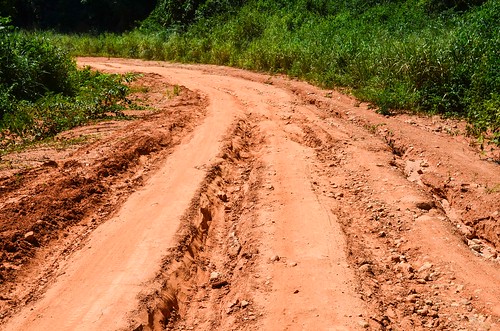

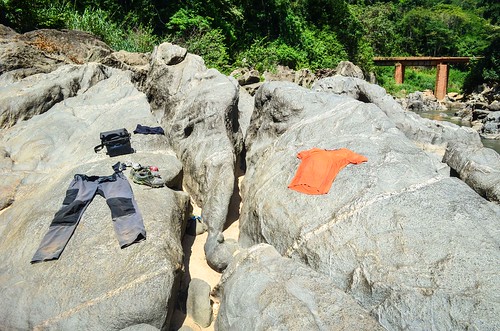
Since the water taps in Ngonguembo were not working, I bathe in the rio Zenza. With the harsh sun, my clothes dry in 10 minutes on the hot stones.
Every time I pass close by people, they come out of their houses or wake up from their nap in the shade to watch me. I disrupt the uneventful rural life. Kids look at my bike like I have parked a Lamborghini in their village. “Look, it even has a lamp!“, “He has cables to charge his phone!“, “But, it is a bicycle without a chain! It must be automatic (editor’s note: the chain is hidden in the chain case)”. Some see the top clips and proudly explain to their friends that it is where I put my feet in. Many adults ask if my bike has an engine. And of course, they are convinced I’m making a lot of money “because it is super hard to cycle“.
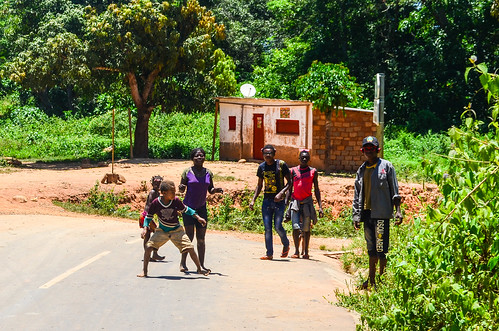
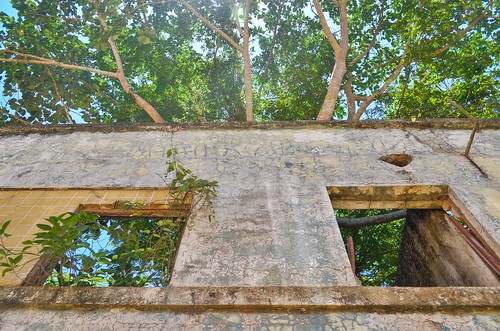

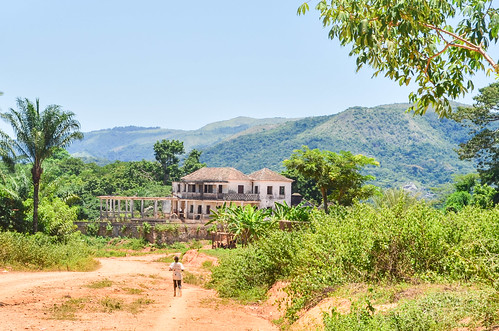
The last 18 kilometers to Golungo Alto are paved. After a few days on remote roads, with no traffic, very few shops selling close to nothing, and progressing at low speed due to the bad surface, I am more than happy the instant I see the darker color of the asphalt. Yet, I am still in for more liters of sweat: 1-2 km uphill, 1-2 km downhill, … it never ceases.
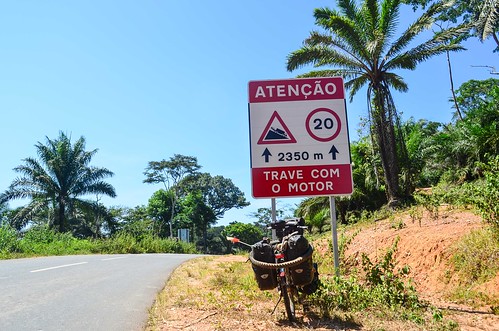
I didn’t eat correctly today as the bakery of Ngonguembo was closed this morning. It is hard to eat well in small towns … or just hard to eat.

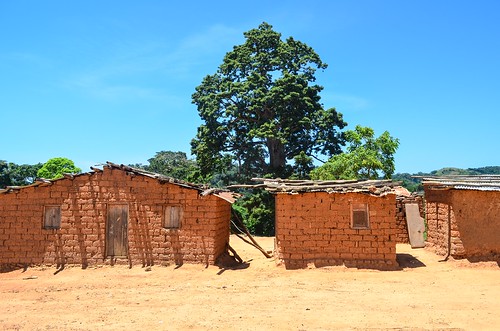
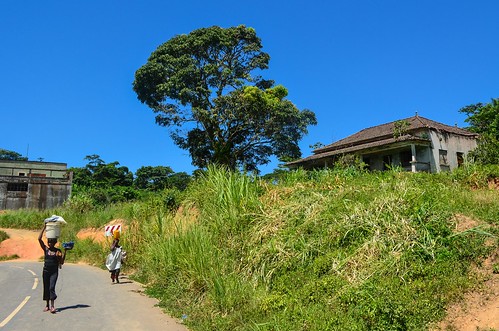
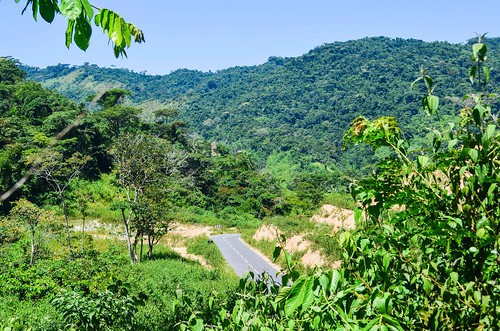
Golungo Alto! Another pretty medium-size town of the Cuanza Norte province. But no food served here either.
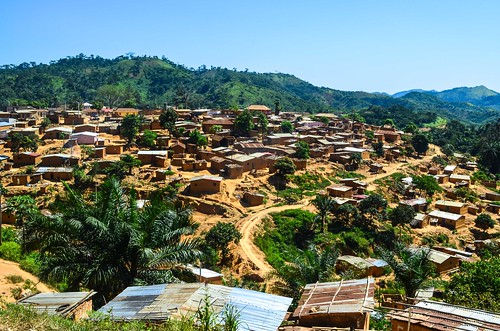
I manage to shop and find bread after several turns in the town without the police catching me. I am now cycling into towns scared by the idea that a policeman will spot me, and force me into the police station for another hour of stupid administration. I look for them on the streets before engaging in, like if I was a well-known bandit or an illegal immigrant.
On my way out of town, two women ask for photos. OK … let’s take photos. One of them says “You reached Ngonguembo at 8 pm last night“.
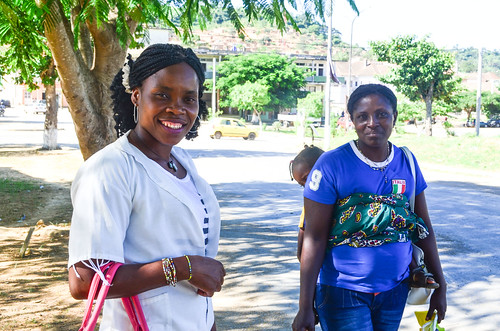
Eh? How come a random woman here knows what I did and when in a town 45 km away? This is scary … I feel watched. This is not FreeWheely, it’s SpiedOnWheely. I don’t have the opportunity to ask her why she knows about me, because at the exact same time, bim! A scooter stops by me, with a policeman on it. “Passport please. Now, follow us to the police station“.
Sigh … Angola is a very beautiful country, but it’s also a sick country. Yes, I have been the only White in so many places and I am used to being unusually controlled at the checkpoints, but not to the extend of recording the names of my parents and my marital status in each small town!
So I am back to a police station, sitting on a wooden bench and surrounded by more than 10 policemen, flipping through my passport pages and amused at all the visas. I will probably lose another hour and risk that the commandante instructs them to keep me in town for the night.
This time, I don’t speak Portuguese. Only English. When I speak Portuguese and tell them all my details in a hurry, to be freed quickly, it seems it only makes them slower. With English only, it is easier: they can’t speak it and they get bored of making sign language after only 30 minutes. Fortunately the big boss was busy and didn’t join the play.
I am now free to go. I hurry onto the brand new tar to Dando before any of them say something else and I can enjoy the freedom ride.

I reach the main highway to Luanda and aim for a small road directly south to Dondo. It’s on the Michelin map, it’s on the map of the petrol station manager, but it doesn’t exist. That forces me to cycle 30 km on a busy road link where trucks drive badly and Toyota pick-ups ignore me on my narrow safety lane. The road is obviously brand new but has already huge potholes. There is only one word for this, “Chinese”! And finally freed from the police for the night, I can camp where I want.

And the day starts well from the first minutes: there is a ripe watermelon growing near my tent. Just one. And just near my tent. A perfect bush breakfast.
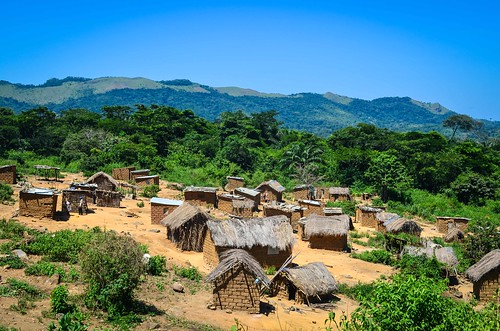
Despite being on a main road, I hear funny noises from the girls and kids by the road. “Ohhhhhh hiiii grbvlxgrbf … “. Eyes wide open, mouth blocked into a position unable to articulate words, they just make noise to express their surprise when I cycle past them. They have surely seen many White people, many bicycles too, but the combination of both is apparently surreal.
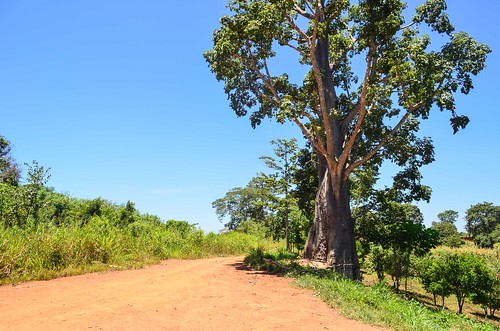
The road to Dondo is very quiet and crossing no villages. Still very scenic, with some signs for AEMR (Angola Exploration Mining Resources) by the road. I don’t know what they are prospecting in the area, and locals can’t tell me, but it is a fact that Angola is not only rich in petrol, but in minerals as well. It makes the world’s top 5 diamonds producing countries in value. Apparently the diamonds are in the East. Not surprisingly, it is close to Botswana, Namibia, South Africa, other notable diamond producers.

I have read that during the civil war, Angola had the highest concentration of tanks since WW2. It would be hard for someone to cross the country without seeing these rusty shells rooted at their strategic locations, in valleys and near bridges.


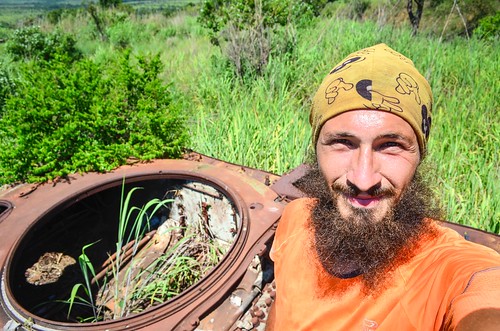
My worry when I reach Dondo is to avoid the police checkpoints. Fortunately, the road further south forks at the first crossroads. I don’t even cross the city, I just buy food at the roundabout and leave in haste.
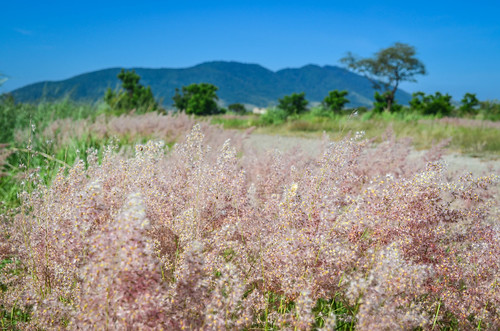
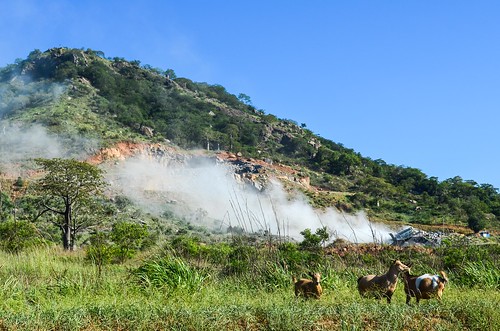
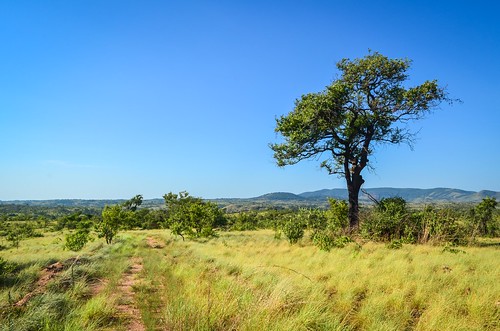
The night catches up with me when I reach the Kwanza river, the 960 km long river giving its name to the currency and to two of the eighteen provinces, Cuanza Norte and Cuazna Sul. There is a police checkpoint on the bridge but they don’t disturb me. Ouf!
The bridge is very close to the Cambambe dam and hydro power station. The land around is clear and empty, there are plenty of places to camp.
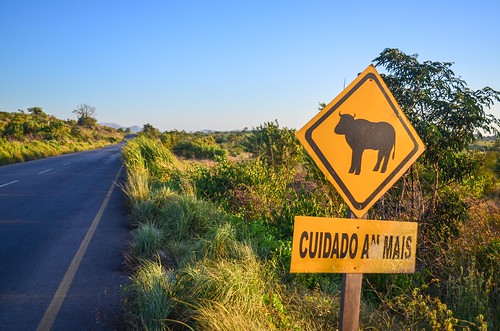
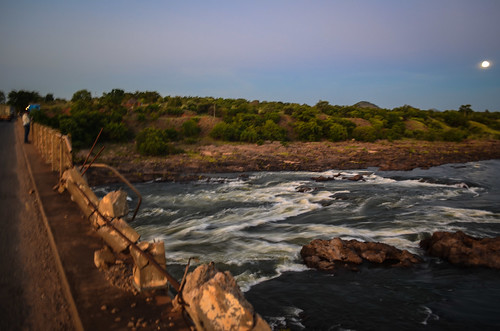
It is a perfect place to camp, or so I thought, while taking a small dirt road away from the traffic, until I met the landmine sign on a tree. Indeed Angola has/had a lot of land mines, and it’s definitely a no-go for wild camping.

There is a landmine removal camp near the bridge. And the first walker I meet confirms me that “there is no problem for walking near the road. But don’t go too far from it!“. Then, it means that I have to camp in a village. The first one is called Aldeia Terra Nova.
It seems the whole village is drinking beers at the single bar. They say the village is safe and I can camp anywhere, “for example, just put your tent there, it’s safe“. Of course it’s safe, the man is pointing at the central place of the village, with the kids, dogs, etc. But I need to sleep, so I will need to go a bit further away.
The village is bordering the Kwanza river and even has a beach. Hidden between large rocks, I find the perfect camp spot and have a private access to the water. It’s warm, good to bathe in, and good to drink too. Air is warm, keeps the mosquitoes away and dries me within five minutes. I set up my mosquito net under the supervision of a small wild spotted cat whose eyes shine when facing my head lamp. I hope it won’t visit me at night. It’s not a joke, it’s called a simba.







Like always! A real fun to read. Stay save! m.